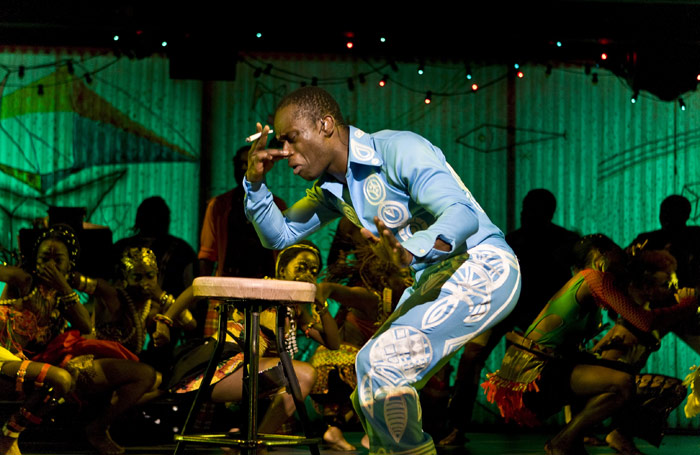
Detroit Music Hall, Detroit, February 19
by Kevin J. Elliott
If ever there was an individual whose persona was bigger than life, it was Fela Anikulapo Kuti. Not only was Kuti Africa’s most legendary musician and the creator of Afrobeat, he was also the continent’s most passionate revolutionary. So it makes sense that his story should be translated seamlessly to the stage. With Kuti’s biography, Carlos Moore’s This Bitch of a Life, as its base, Fela! the musical writes itself, vividly incorporating all the music and dance integral to Fela’s legacy, as well as the tumult in Nigeria sparked by the voice of the nation’s self-proclaimed “Black President”—all with very few artistic liberties.
For those blindly approaching Fela Kuti through this production, it will serve as a comprehensive primer. The focus is, as it should be, on the power of his music, and the audience is immediately indoctrinated to a night at the Shrine (Kuti’s real-life Lagos club) for what Fela tells us is his last performance there. With a full 10-piece band blaring the hypnotic miasma of horns, Highlife guitars, polyrhythms and the all-important funk backbone that define Afrobeat, Act I shows how Kuti’s education and travels abroad culminated in his creation of the genre and why he chose to bring it back to Africa. From there the mood quickly shifts, using Kuti’s endless catalog as a narrative for all of the high and low points of his history.
Purists will be happy to know that Fela! does not erase or gloss over the warts and scars that dotted Kuti’s journey. After a trip to Los Angeles where he meets his first true love, Sandra, who exposes him to the Black Panther movement, Kuti returns to start his revolution. Fortunately, the musical is devoid of any Disney-fication. For one, the play retains the Pidgin English of Fela’s music (used to translate his message to all Africans) and the harsh and sometimes crude language found in his many interviews. Yes, the music is abridged from Kuti’s usual 15-20 minute jams, but that lends to the telling of his story. For instance, “Expensive Shit,” details his jailing for drug possession and 10-day refusal to give up the evidence from his other end. Sitting with one of his trademark blimp sized joints in hand, Fela walks us through the incident, the lyrics of the song emblazoned against the back of the Shrine’s walls. Each suite explains an important step in Kuti’s evolution from entertainer to outspoken firebrand, including “Zombie,” a gruesome rally against the Nigerian military, which ends in his torture, or “ITT,” one of Kuti’s most controversial songs calling out the corruption, greed, and corporate glad-handing of the Nigerian puppet government. While there are plenty of uplifting and humorous moments to lighten the drama—Fela’s interplay with his chorus of nine wives is a perfect foil—most of the second half deals with his relationship with his mother and the increased tension against Fela’s independent Kalakuta Replublic, concluding with the brutal raid of the compound that resulted in his mother being fatally thrown from a second-story window. Though Kuti’s life needs little decoration, the final third of Fela! is an illusion-filled phantasmagoria that imagines Kuti delving deeper into his Yoruba beliefs to communicate with his dead mother. This is perhaps the most Fela! flirts with true Broadway, including newly arranged compositions and showcasing the operatic range of Paulette Ivory (who plays Funmilayo, Kuti’s mother). But even this finale does not follow the norm (there is no happy ending), and much like the rest of Fela! it transcends musical theatre, inviting the audience in as if it’s just another joyous night at the Shrine.
The Book of Drugs
The Gories Live Review
Jeff Mangum and Califone Live Reviews
Scud Mountain Boys Live Review
Kill All Redneck Pricks: A Documentary Film About a Band Called Karp
Death of Samantha Live Review
Kathryn Calder and Mark Eitzel Live Review
The Ballad of Mott the Hoople
I Want My MTV: The Uncensored Story of the Music Video Revolution
Lindsey Buckingham Live Review
Scratch Acid Live Review
Def Jam Recordings: The First 25 Years of the Last Great Record Label
Beats, Rhymes & Life: The Travels of A Tribe Called Quest
Put the Needle on the Record
